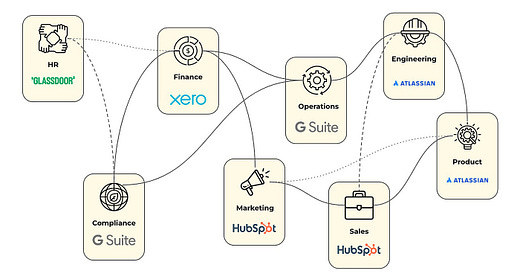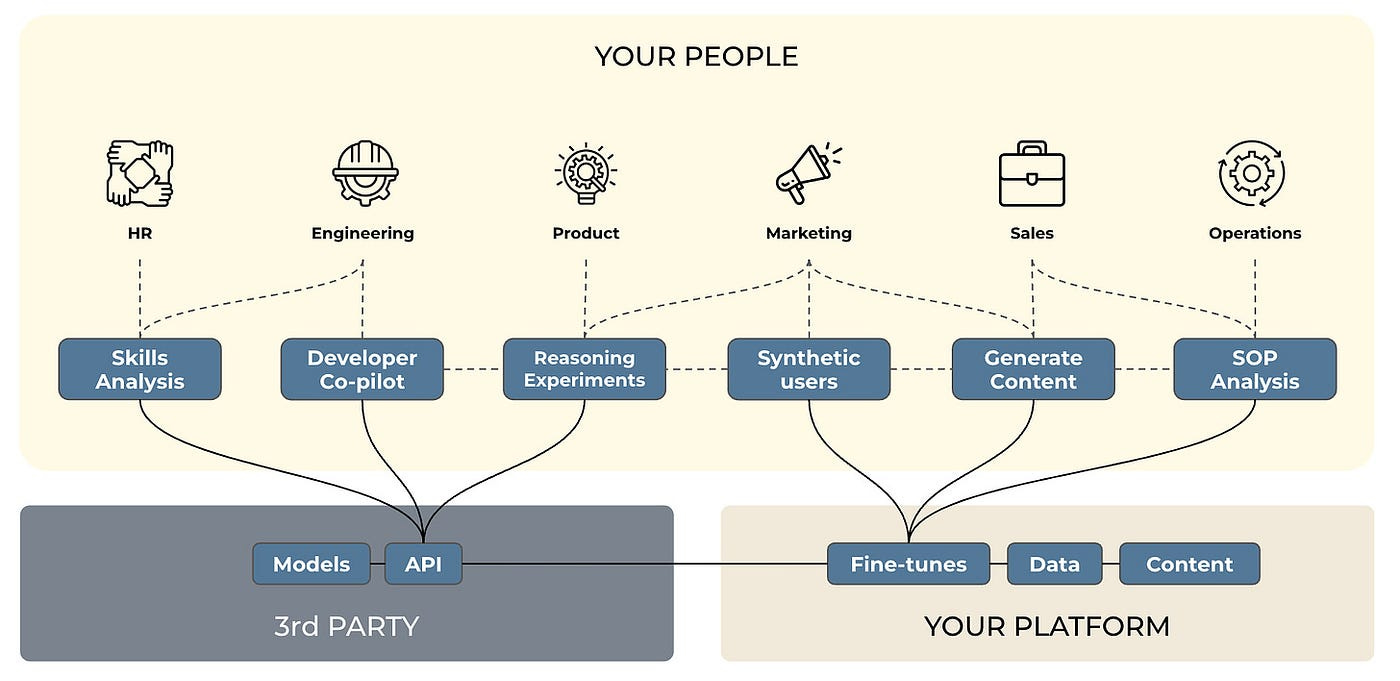At the beginning of my career, we didn’t have SaaS.
Tech companies would just build whatever they needed. Even smaller businesses had things like home-baked hour sheets, CRMs, or even ERPs. This is how we got “legacy software”. Mostly they were terrible, built by a rotation of poorly motivated summer interns, and everyone complained all the time.
Then SaaS happened. Just like there’s an app for that, there’s for sure a SaaS for that.
Now the basic startup operating system is a spiderweb of SaaS. And as any founder will attest, the bills add up really quickly. I guarantee there are SaaS tools used by your business right now your CFO has never even heard of. You do have a CFO, right? Right?!
The worst part is these guys are so fat on their gross margins, they don’t even innovate. I’ve used JIRA for most of my career, and it literally looks exactly the same when I started. All they did was move the same ugly software onto the cloud ten years ago. Possibly made some button edges rounder. Just slightly.
This has gotten so out of hand, that we need SaaS to manage your SaaS bills. I’m not kidding.
The AI OS
Often SaaS tools fill smaller tactical gaps, where a whole suite like Salesforce, Hubspot, or even Shopify is complete overkill. With the help of AI, and soon by AI agents, you will build something yourself.
The end result could look like this. You build out features across domains that are specific to your industry and use case and then deploy them as lightweight web apps or just microservices. For things you don’t want to build, you use mostly APIs. Something like Stripe, perhaps.
You might have dedicated UIs, and then at some point start connecting the dots and aggregating them into a larger suite integrating domains like sales and marketing, for example. Basically Hubspot.
The beating heart of this software will be AI and LLMs. In some cases, these entire workflows might be automated, where no UI is needed, and AI just navigates a series of API calls to do the job independently.
Don’t believe this is possible today? Here’s an example of how an intern at a YC startup built an AI-powered invoice processing pipeline instead of paying $16K for a SaaS tool. It took him, wait for it… two hours.
You can check it out on Gumloop, another YC-backed AI startup that allows you to create Zapier-like automation workflows for AI. As you can see, this isn’t even about using AI to create code. This is simply an LLM doing the job that would have previously required specialized software.

An LLM now analyzes any receipt sent to their Gmail, extracts vendor and amount, categorizes the receipt, saves it to their Notion DB, and finally texts their finance admin.
This is how you start your AI OS.
What about more complex software?
The case is easier to make for startups, where often you just need something to do a little job. Over time, those jobs start widening in scope, as the complexity of the product and operations increase. The startup gets rich and fat and becomes a corporation.
Corporations care about security and compliance. Software vendors take care of that, or at least say they do. So there is an element of outsourcing risk, too. If things go bad, you can point your accusing finger at the startup, and still keep your bonus.
I don’t think enterprise software is any safer, necessarily. It will take more time, but the same recipes that work for startups today will eventually work for enterprises once the AI agents are more robust to handle the complexity.
Meanwhile, there is a secondary trend at play here. Which is that AI is also increasing developer productivity. Some say a few percent. Sam says 300%.
For the sake of the argument, I ran a simple model to work out how much impact AI efficiency might have on the cost per line of code. I added some basic assumptions like economic growth and inflation which should drive prices higher, low price elasticity due to increasing demand, as well as gradually declining supply of developers due to pursuing other careers better protected from AI job displacement.
Despite all these factors, code will get cheaper as AI takes over. Possibly so cheap it will not only become marginal but kind of irrelevant. This is also a rather conservative model because we’re only looking at incremental improvement in efficiency.
When AI agents get good enough to take on larger programming tasks at production scale and quality, the cost floor would drop in a straight line.
Not all SaaS is created equal
Code is cheap. Who lives, who dies? Who decides?
The companies that are going to be more exposed are the pure SaaS plays, where the software itself is the product. Obviously, most companies are not going to create their own Photoshop. That seems overkill in many cases.
However, creating your own CRM wasn’t that unusual before SaaS. That could be a thing. Technical platforms like Datadog are at risk. Most startups use it because it seems like a good idea, but end up wasting money but logging useless debug outputs. Seems like something an LLM could do.
Having said that, these companies won’t give up without a fight. Many are already adding various AI integrations to their software suites. But the reality of corporations is that they find it hard to reinvent themselves for a new era, which in this case will be AI-native alternatives. The Innovator’s Dilemma will keep them milking the SaaS teet, unwilling to sacrifice even one quarterly EBITDA target until it’s too late to catch up. The competition here isn’t new startups, it’s their current client base cutting the cord.
The companies that are much better placed to survive are the ones actually offering a service where the software just facilitates access to the product.
Paypal and Stripe take a huge amount of pain and financial risk away in exchange for a margin in transaction fees. It’s unlikely you’re in a hurry to replace those. Shopify adds the physical layer of logistics and a rich ecosystem of partners that goes far beyond code. Others like Square provide actual hardware, that you’re simply not going to replace that easily with more code.
If anything, AI will likely cement the position of these players, as it will create further efficiencies that widen their financial moats, allowing them to operate at razor-thin margins at gargantuan volumes, serving mostly AI-based agents instead of humans.
Originally posted on Medium here. More about AI OS from my talk at API Days 2024 in Singapore below. You can find the podcast version here.








Running payroll off of something AI spit out in a 2 hour session. What could go wrong?
SaaS will transform to micro, personalized services that are well connected to industries’ ecosystems.
The competition will be even more brutal